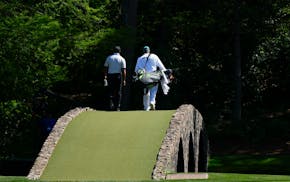The first time I met Bud Selig was when he walked into the County Stadium press box late in a Brewers' loss to the Twins in 1993, and loudly complained about his bullpen.
The first time I interviewed Selig, he invited me to his office in the basement of County Stadium. Newspapers from all over the country stood in chest-high stacks. He had read most. He was in the process of trying to read the rest when I removed a few copies of the New York Times from a chair and experienced my first Selig filibuster.
"You know, as I was just saying to Carl yesterday, and Carl is a good friend ..."
He began his baseball life by becoming a minority owner of the Milwaukee Braves. When the team left town for Atlanta in 1966, he dedicated himself to returning baseball to his hometown, and succeeded when he purchased the Seattle Pilots in bankruptcy court in 1970 and changed their name to the Brewers, after the minor-league team he watched growing up.
Last week, baseball's owners ignored his vows to retire and insisted he sign a two-year contract extension that will continue Selig's reign as the longest-tenured commissioner in major professional sports.
Even if you don't, as I do, find Selig to be both likeable and adept, you have to recognize that this is a quintessential American success story. Selig grew up hoping to watch games through a knothole and wound up running the whole sport.
"You're right about that old office," Selig said. "I remember water leaking through the roof. Of course, I still read a lot of papers. I just knocked off five of them, and I still get all the clips every day. I'm old-fashioned that way.
"Yes, we've come a long way from those days, and from '94 and the heartache of the strike. We went through all those years of labor fights, '72 and '75 and '76 and '80 [and '81] and '85 and '90 and that heartbreaker in '94, and now we have 21 years of labor peace [with a collective bargaining agreement through 2016], and we've proven we have more parity in our game than any other sport, and I'm not sure why people don't believe that ..."
He went on for a while. This is how Selig answers a question. He takes off from New York and ends up in San Francisco, and doesn't mind sailing around the tip of South America to get there.
Selig, 77, was speaking from his office in Arizona, dropping names, circumnavigating, pulling U-turns without signaling. He has an office in New York, of course, at Major League Baseball's home base, and usually works out of his beautiful high-rise office in Milwaukee overlooking Lake Michigan.
The former dreamer is rich and powerful now, making an estimated $22 million a year, and yet is different than his peers. NBA Commissioner David Stern is smug and self-important. NFL Commissioner Roger Goodell is driving a Bentley but he's merely the valet.
Most commissioners wield silver spoons; Selig prefers the plastic ones at Gilles Frozen Custard, his favorite Milwaukee lunch spot.
Selig is, as his friends call him, merely "Buddy." In fact, during every conversation, Selig quotes his friends calling him "Buddy" and uses your first name, because he never pretends to live above the fray.
Everything is personal to Selig. He has been known to cold-call sportswriters with whom he disagrees. Most captains of industry insulate themselves from criticism; Selig not only stands in against beanballs, sometimes he charges the mound.
"It is difficult to deal with criticism, and back in the '90s, when it was coming from all sides, it got to the point where my wife wouldn't watch TV or read the papers," Selig said. "I felt, baseball is a social institution. With that comes a lot of things, and among them is social responsibility.
"People feel deeply about our sport, and they will be very critical when they disagree with how it is run. So while I don't like the criticism, I think if you're sensitive to it and understand it and think about it and find it rational, you can learn from it."
When he became commissioner, Selig was criticized for being an owner, and an owners' puppet. He solved the first problem by selling his beloved Brewers. He solved the second by becoming the only kind of commissioner who could succeed in a sport beset by chronic labor problems and growing economic imbalance, by unifying owners and forging lasting peace with the players.
Under Selig's watch, baseball has more than quintupled its revenues, built new ballparks in almost every city that needed one, avoided labor stoppages, instituted revenue sharing and interleague play and belatedly cracked down on performance-enhancing drugs.
Selig remembers his fellow owners, including the Twins' Carl Pohlad, urging him to become acting commissioner in 1992.
"The first owner to bring it up to me, believe it or not, was George Steinbrenner," Selig said. "George and I were very close although we agreed on nothing. Zero. Then Carl brought it up to me. We were in New York, it might have been '90, and Carl was on the labor relations committee and they were having terrible problems.
"So Carl and [White Sox owner] Jerry Reinsdorf and myself went out to a deli near our hotel, and had a bowl of soup and a sandwich, and Carl said, 'Buddy' -- he always called me Buddy -- he said, 'Buddy, you've got to think about becoming the commissioner.' I said, 'Oh, no.'"
Selig offered similar protests last week.
"I really believed that I'd be done at the end of this year," he said. "I'm already teaching at Marquette Law School and I teach a course in Madison. Then a month ago or more, I started hearing from owners, 'Gee, you've got to do this, and here's why.' The thing that struck me was the emotion and intensity and the sincerity. I finally said, 'I guess it's the right thing to do.'"
Selig also let this slip: "I guess I'm going to come close to Landis, God willing, if my health holds up; it's hard to believe."
Yes, it is. Baseball's bookend commissioners are Judge Kenesaw Mountain Landis, who ruled the game from 1920 to 1944, and Buddy from Milwaukee, who has been cajoling owners and rubbing shoulders for 20 seasons.
Buddy has a story about that...
Jim Souhan can be heard Sundays from 10 a.m. to noon and weekdays at 2 p.m. on 1500ESPN. His Twitter name is Souhanstrib. • jsouhan@startribune.com

Souhan: This is KAT's chance to prove Flip Saunders was right

Souhan: Why Tiger Woods should keep swinging
Souhan: Scheffler wins Masters again, shows what makes him special
Morikawa falters in final round at Masters


